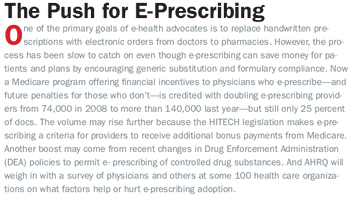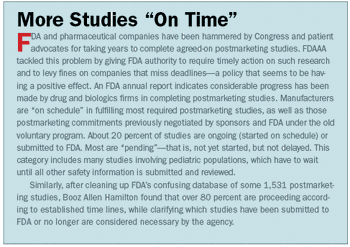
GSK's blockbuster diabetes drug Avandia was the subject of a number of studies this week offering good and bad news. But the company's big challenge is going to be FDA's advisory review panel set to meet in two short weeks.

GSK's blockbuster diabetes drug Avandia was the subject of a number of studies this week offering good and bad news. But the company's big challenge is going to be FDA's advisory review panel set to meet in two short weeks.

FDA's meeting on the adoption of REMS for certain prescription opioids doesn't begin until July 22, but the agency's proposal released Tuesday portends a meeting fraught with conflict over the balance between curbing abuse and protecting patient access.

The Orphan Drug Act of 1983 has been a roaring success. So why is everybody trying to mess with it?

Under the new healthcare regime, pharma will ante up fees and rebates in return for expanded sales and safeguards.

A new Cegedim Dendrite study shows just how ill-equipped pharmaceutical companies are to deal with spending disclosure legislation, and how many are turning to third parties to do the job.

FDA Commissioner Margaret Hamburg looks to bolster the agency's scientific expertise.

The Indian generic firm Ranbaxy was dealt another blow this week as its version of the enlarged prostate drug Flomax was denied approval in the US just as it was about to go to market.

FDA's new Sentinel System is going live, but the signals may be difficult to assess.

Pharma companies need a clear online policy that addresses employee obligations, monitoring guidelines, and engagement roles.

Obligations to fund and support costly studies can extend beyond the period of market exclusivity, giving generics competitors an advantage.

Added funds for FDA to come from new user fees, largely for food and tobacco regulation.

The popular antidepressant is associated with up to 91 percent increase in risk of death in patients undergoing tamoxifen treatment for breast cancer.

R&D is surging, but new methods and data raise new manufacturing and regulatory challenges.

At time when people can't even get a 3 percent cost-of-living increase, how can pharma justify price hikes pushing 500 percent (in some categories). A new study by the government's General Accountability Office examines why drug products took a massive price leap in recent years.

The push for government transparency continues with Phase I of FDA's plan to expose the inner workings of that secretive cabal known as the Food and Drug Association. First up, fancy new FAQs.

Sanofi-Aventis is recalling hundreds of thousands of doses of the childrens' version of its H1N1 vaccine. Conspiracy theorists are going to have a field day.

Painkiller abuse has become so prevalent that FDA is working with pharma to create a strategy for handling misuse of all drugs across the entire opioid category.

Drug manufacturers came under fire at a hearing of the House Energy and Commerce?s health subcommittee for bumping drug prices 10 percent this year. Pharma claims rumors that it?s boosting costs in anticipation of healthcare reform are baseless, but the industry could be facing an uphill battle.

They already dominate the pharmaceutical market, and now generics are poised to move into biologics and complex dosage forms.

FDA and Congress weigh policies for improving drug safety via ads and written information.

The US oversight arm scripted a hefty report complaining that FDA is not moving fast enough when it comes to screening clinical trials data for drugs green lit through its expedited approval program.

All the focus on drug safety raises concerns about FDA delays in approving new drugs for market.

Collins seeks to parlay genomic discoveries into new biomedical therapies. Comparative effectiveness research, he says, should identify subpopulation responses to treatment and support personalized medicine.

Pain medications containing propoxyphene could lead to overdose and death, according to new labeling mandated by FDA. However, public requests to take these drugs (including Darvon and Darvocet) off the market have been denied.

Feds claim results of study comparing car crash deaths and children on ADHD drugs were not paramount to pulling kids off of ADHD treatments.